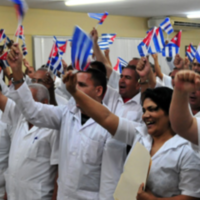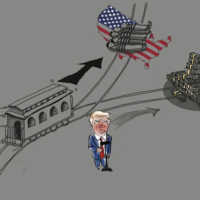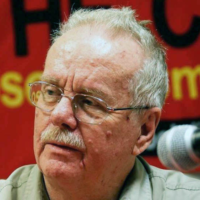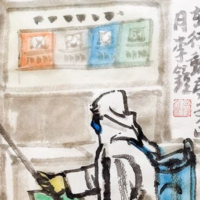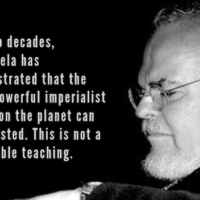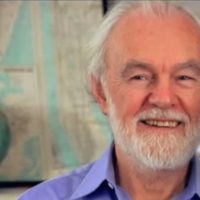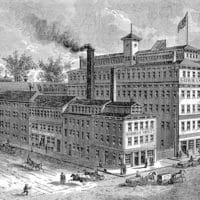-
Trump’s narcoterrorism indictment of Maduro already backfires
Among those indicted by the U.S. was Cliver Alcalá, a retired general who is considered the military leader of the pro-Juan Guaidó forces. Soon, Alcalá posted videos that threaten to cause further splits in the opposition and could result in the arrest of Guaidó.
-
Cuba sends doctors, nurses worldwide in COVID-19 fight
Cuba on March 28 sent a team of 39 doctors and nurses to Andorra, the thirteenth medical brigade the country has dispatched overseas to combat the COVID-19 pandemic.
-
All the craziest things about America are being highlighted by this virus
“Corona is a black light and America is a cum-stained hotel room,” comedian Megan Amram colorfully tweeted a couple of weeks ago. Her observation has only grown more accurate since.
-
‘For common benefit of all,’ Ireland nationalizes hospitals for duration of Coronavirus crisis, sparking demand for U.S. to follow suit
“How wonderful is this. A beautiful silver lining.”
-
Ecosocialism or barbarism: an interview with Ian Angus
In an interview with roape.net, ecosocialist and writer Ian Angus discusses the environmental crisis, the Anthropocene and Covid-19. He argues that new viruses, bacteria and parasites spread from wildlife to humans because capital is bulldozing primary forests, replacing them with profitable monocultures. Ecosocialists must patiently explain that permanent solutions will not be possible so long as capital rules the Earth.
-
Has America reached its endgame in Afghanistan?
In an extraordinary statement titled “On the Political Impasse in Afghanistan,” Washington has admitted to the failure of Secretary of State Mike Pompeo’s mission to Kabul on March 23, which was taken up to heal the political rift among Afghan politicians and to urge them to form an inclusive government so as to implement the peace agreement signed in Doha on February 29.
-
Letter from Catalonia: Alarming measures
I’m in a small city in Catalonia called Olot, not far from the Pyrenees. I came here because I knew the coronavirus lockdown would be much rougher in Barcelona. Still, people walk around with masks and keep social distances, barely going out.
-
We won’t go back to normal, because normal was the problem
It is hard to remember that just a few weeks ago, the planet was in motion. There were protests in Delhi (India) and Quito (Ecuador), eruptions against the old order that ranged from anger at the economic policies of austerity and neoliberalism to frustration with the cultural policies of misogyny and racism. Ingeniously, in Santiago (Chile), during its wave after wave of protests, someone projected a powerful slogan onto the side of a building: ‘we won’t go back to normal, because normal was the problem’.
-
Venezuela’s Coronavirus response might surprise you
Within a few hours of being launched, over 800 Venezuelans in the U.S. registered for an emergency flight from Miami to Caracas through a website run by the Venezuelan government. This flight, offered at no cost, was proposed by President Nicolás Maduro when he learned that 200 Venezuelans were stuck in the United States following his government’s decision to stop commercial flights as a preventative coronavirus measure.
-
How market reforms made the NHS vulnerable to pandemics
A 2014 report warned that reforms to the NHS would make it vulnerable to pandemics – by making staff redundant, undermining public health and defining spare capacity as waste. It was ignored.
-
An often overlooked region of India is a beacon to the world for taking on the coronavirus
In a pandemic, a rational person would much rather live in a society governed by the norms of socialism than of capitalism, a society where people rally together to overcome a virus; than to live in a society where fear pervades and where stigmatization becomes the antidote to collective action.
-
Unemployment pandemic
Capitalist crises are neither predictable nor do they stem from a single cause. Instead, at least as I see it, the possibility of a crisis is always there but the causes and triggers are all historical and therefore multiple and varied.
-
The role of intellectuals in the Bolivarian Revolution: A conversation with Luis Britto Garcia
Venezuela’s most acclaimed contemporary writer talks about the Bolivarian Revolution and its dialectical relation with cultural producers.
-
Anti-capitalist politics in the time of COVID-19
When trying to interpret, understand and analyze the daily flow of news, I tend to locate what is happening against the background of two distinctive but intersecting models of how capitalism works.
-
Liberal NPCs hate Russia, Conservative NPCs hate China
The frenzied, shrieking hysteria I’m witnessing right now among Trump’s base regarding China looks and moves in the exact same way the mental zombification of Russia hysteria looked and moved when it began tearing through rank-and-file Democrats in late 2016 and early 2017. The seething, screaming vitriol I get from the MAGA crowd on social media when I talk about this is identical to what I got during that period from Democrats: just as irrational, just as vituperative, and just as emotion-driven.
-
What is ‘social democracy’?
GOOD question! Look up the term in a dictionary and you’ll find a definition something along the lines of “an ideology that advocates or supports political, social and economic interventions to promote social justice within the framework of a representative democracy and capitalist economy.”
-
The mutilated world is moved by the nurses and doctors
SARS-Co-2 or COVID-19 moves swiftly across the planet, leaving no region untouched. It is a powerful virus, with a long enough incubation period to hide the symptoms and therefore to gather more and more people in its deadly arms.
-
Mike Davis on COVID-19: The monster is finally at the door
We are in the early stages of a medical Katrina. Despite years of warnings about avian flu and other pandemics, inventories of basic emergency equipment such as respirators aren’t sufficient to deal with the expected flood of critical cases.
-
Engels’ pause and the condition of the working class in England
Engels was just 24 years old when he wrote the Condition. He had already developed left-wing ideas when he was despatched to England at the end of 1842 to work in the family firm of Ermen and Engels, manufacturers of sewing thread in Manchester.
-
Building Capacity with Money on the Left
This month’s Money on the Left episode departs from the show’s regular interview format to reflect on the past, present and future of the Money on the Left project as a whole. We focus, in particular, on a recent special scholarly journal issue dedicated to Money on the Left, which was published by Liminalities: A […]


